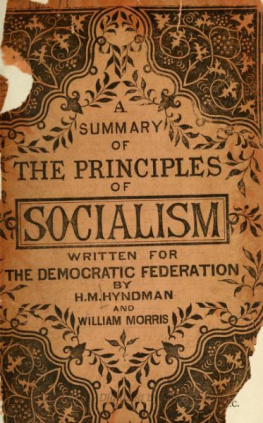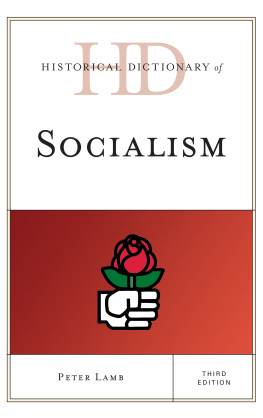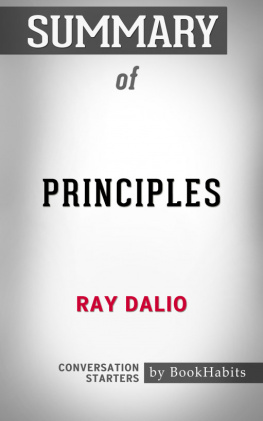A Summary of the Principles of Socialism
Here you can read online A Summary of the Principles of Socialism full text of the book (entire story) in english for free. Download pdf and epub, get meaning, cover and reviews about this ebook. publisher: Marxist Internet Archive, genre: Politics. Description of the work, (preface) as well as reviews are available. Best literature library LitArk.com created for fans of good reading and offers a wide selection of genres:
Romance novel
Science fiction
Adventure
Detective
Science
History
Home and family
Prose
Art
Politics
Computer
Non-fiction
Religion
Business
Children
Humor
Choose a favorite category and find really read worthwhile books. Enjoy immersion in the world of imagination, feel the emotions of the characters or learn something new for yourself, make an fascinating discovery.
A Summary of the Principles of Socialism: summary, description and annotation
We offer to read an annotation, description, summary or preface (depends on what the author of the book "A Summary of the Principles of Socialism" wrote himself). If you haven't found the necessary information about the book — write in the comments, we will try to find it.
Unknown: author's other books
Who wrote A Summary of the Principles of Socialism? Find out the surname, the name of the author of the book and a list of all author's works by series.
A Summary of the Principles of Socialism — read online for free the complete book (whole text) full work
Below is the text of the book, divided by pages. System saving the place of the last page read, allows you to conveniently read the book "A Summary of the Principles of Socialism" online for free, without having to search again every time where you left off. Put a bookmark, and you can go to the page where you finished reading at any time.
Font size:
Interval:
Bookmark:
Written for the Democratic Federation,
BY
H. M. Hyndman and William Morris.
LONDON: THE MODERN PRESS
13 AND 14, PATERNOSTER ROW, E.C.
1884
WILLIAM REEVES, 185, Fleet Street, London, E.C.
SOCIALISM, as a social and political system, depends altogether upon the history of mankind for a record of its growth in the past, and bases its future upon a knowledge of that history in so far as it can be accurately traced up to the present time. The groundwork of the whole theory is, that from the earliest period of their existence human beings have been guided by the power they possessed over the forces of nature to supply the wants arising as individual members of any society.
Thus Socialism rests upon political economy in its widest sense - that is, upon the manner in which wealth is produced and distributed by those who form part of society at a given time. Slavery, for instance, arose when men had reached such a point in the progress of the race that each labourer could produce by his work for a day, a week, a month, or a year more than was needed to keep him in health during that period. Then captives in war, instead of being killed, were enslaved, and the fruits of their labour, over and above their necesssary food, were taken by the conquering tribe; for though slavery arose in the nomadic state the earliest form of co-operation and ownership was by atribe ; and in the tribal relations common property was the rule alike in the soil and in the produce of labour.
As this common property broke up owing to the progress of the economical forms, the growth of exchange, the superiority of individuals or families in war or in the chase, classes or castes were gradually formed, resting in the first instance upon a necessary division of labour, though often existing, as in village communities, where a modified form of common property was still the rule. Thence again, institutions developed through custom and law ; religion sanctifying what had previously been found to be on the whole necessary or expedient. These institutions, though arising from the material power of man over nature, had in turn a great influence upon the manner in which that power was used, and appeared as the conservative side of human development conflicting with the progressive or revolutionary side, which necessarily follows upon the improvement and adaptation of the methods of producing food and wealth. From this essential and constant antagonism arises the conflict between classes in every civilisation of which we have any knowledge ; and upon the struggles dueto this conflict all progress has hitherto depended.
A slight consideration will serve to show that this is the true explanation of the growth of mankind. The first object of every animal, man included, is to feed itself and its offspring ; and man began in the nomadic state by feeding upon fruits and berries. That the growth from the early brutish habits upwards to the taming of beasts and ordered agriculture was the process, not of thousands but of millions of years, is now admitted by all scientifc writers on the records of Primeval man. But the need for food was followed by ibe need for clothing, for warmth, for shelter; and each of these wants corresponded in turn with changing forms of social life as they were gratified. The whole, in fact, moved in one piece as the economical forms developed : the nomadic life of the woods and plains ; the common property of the tribe or clan scanty and insufficient ; the more confined area of operations as agriculture became an increasing business ; the struggle with neighbouring tribes about rights of pasture or to obtain coveted spoils ; the earlier or later introduction of slavery in place of wholesale slaughter of captives ; the development of division of labour and exchange slowly breaking up the common property ; the institution of private property in land, rendered necessary by the simultaneous improvements in agriculture ; the increase of individual wealth, as cultivation and division of labour progressed on a larger scale, due to money-usury and slave-ownership ; the construction of classes representing divergent interests ; the struggle between the various classes and those above them ; the enormous development of the slave class and the poorer citizens in Greece and still more in Rome ; the gradual formation of customs, laws, religions growing out of these ever-changing, ever-progressing, economical forms ; the constant appeals of the privileged orders to these customs, laws, and religious doctrines as the wisdom of the past not to be rudely shaken by the new-fangled, subversive theories of revolutionists, who were themselves but the unconscious exponents of such inevitable modifications - a careful study of each link in the chain of this long development, will show clearly how man in society has been the result of ages on ages of slow growth, in which the individual is lost in utter insignificance, and special inventions such as fire, the wheel, the mining, smelting, and working of metals, become manifestly but the inevitable results of the social state which produces them.
Leaving on one side the civilisations of Egypt and Eastern Asia, important as they are to a knowledge of our social growth - for only seventy generations of thirty years each take us back to a period when Britain was practically unknown, and Roman civilisation was in its infancy - it is sufficient to deal briefly with the decay of the Roman Empire, the feudal institutions which sprang up on its overthrow, and, more in detail, with the special circumstances which have influenced the progress of the people of Western Europe to the existing capitalist rule. The fact that the ancient civilisations of Greece and Rome were supported by open and acknowledged slavery of the mass of the producing class, renders all comparison of democracy, in the modern sense, with the so-called democracies of Greek or Roman society utterly futile. The economical and social conditions are entirely different.
Those Greek republics, which have so often been the theme for adulation on the part of democratic orators, poets, and artists, were themselves but close oligarchies; and the slave-class below was the basis of the whole super-structure alike at Athens, Corinth, and Sparta. The very numbers of the slaves show how completely the social arrangement was accepted as inevitable ; for at Athens there were at least 120,000 slaves to 20,000 citizens, while at Corinth the slaves at one period numbered 460,000. Moreover, economical causes having produced slavery, force was long little needed to maintain the supremacy of the upper classes, who could carry on their own warfare among themselves almost undisturbed by fears of a slave revolt. In Rome the same forms appeared in rather different clothing, though in both the slaves were often learned, highly-trained men, widely different from the ignorant human machines whom we are accustomed to associate in our minds with the word slaves. In Rome, the insurrections of the slaves were more numerous and more formidable than in Greece. But, in this case, too, the conflicts between the various sections of the privileged classes were almost undisturbed, if we except the great insurrection of Spartacus, by the efforts at enfranchisement on the part of the slaves, who rarely timed their risings well and were massacred wholesale in Italy and Sicily at comparatively little cost of life to their masters.
Early in the record the slave-industry, controlled by the powerful landlord-capitalists of Rome and the other great cities of the Empire, began to crush out and even to enslave the small freeholders who had arisen on the break up of the tribes, or who belonged to conquered nations. Their independent work, with a few slaves around them, could make no head against the enormous production for gain which their large competitors carried on. The Licinian Law, and the agitations of the Gracchi were meant to protect the vigorous yeomen from forcible and still more from economical expropriation. But the movement was too strong to be resisted. Large properties grew steadily larger, and these great farms ruined not only Italy but other portions of the empire. The soil, though rich, was exhausted in the course of generations by ceaseless over-cropping for profit alone ; the slave class of the country supported a useless and very numerous slave class in the towns ; and the condition of the poor, free, Roman citizen became so bad that economically it could scarcely be worse. Thus, the prosperity of the whole empire was steadily sapped, and some regions have scarcely recovered the process unto this day. The Eastern Provinces, which had a history of their own even throughout the period of Roman domination, suffered less than the rest, whilst they provided the great proprietors of the metropolis with their luxuries, and thus regained in part by commerce what they lost by tribute.
Font size:
Interval:
Bookmark:
Similar books «A Summary of the Principles of Socialism»
Look at similar books to A Summary of the Principles of Socialism. We have selected literature similar in name and meaning in the hope of providing readers with more options to find new, interesting, not yet read works.
Discussion, reviews of the book A Summary of the Principles of Socialism and just readers' own opinions. Leave your comments, write what you think about the work, its meaning or the main characters. Specify what exactly you liked and what you didn't like, and why you think so.











